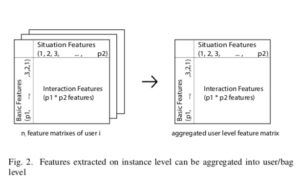DAC Student Spotlight: Lei Zhang

Lei Zhang, DAC Ph.D. student in the Department of Computer Science

Graphic is from Zhang’s research on “Situation-Based Interpretable Learning for Personality Prediction in Social Media”
Lei Zhang was a master’s degree student in software engineering at Jinan University in China when his advisor told him about meeting Chang-Tien Lu from Virginia Tech and how he was doing research with algorithms on Twitter. While they were using different platforms — Zhang’s own work was on Weibo, the largest Chinese microblogging website — he was interested to hear about Lu’s research.
When he decided to pursue a Ph.D., Zhang decided to apply to Virginia Tech’s Department of Computer Science. As it turned out, Lu is now his advisor.
Zhang’s current research at the Discovery Analytics Center includes graph structure learning.
“Graph neural network models have shown that they can be widely used for urban computing, neuroscience, biology, and many other fields,” said Zhang. “However, the graph structure can be either non-existing or not optimal for specific objectives. Take a traffic network as an example. Graph structure learning techniques can construct a causal graph of traffic flow changes which is more informative than just the grid graph.”
Zhang has also integrated psychology and machine learning. He has designed a text classification model utilizing the DIAMONDS situation taxonomy from psychology. Zhang is also working on some neuroscience-inspired models such as spiking networks, oscillation networks, and echo state network.
“My research interests originated from my experience reading popular science books when I was younger,” said Zang. “Three topics I liked most are complexity science, psychology, and AI. While my own research did not start from the most relevant areas, it is getting closer and closer,” he said.
Zhang said working with “very smart” DAC students is an added plus to what he is learning from expert machine learning/data mining professors on campus.
Lu and another DAC student were among Zhang’s collaborators on a paper he presented at the 2018 IEEE International Conference on Big Data entitled “Situation-Based Interpretable Learning for Personality Prediction in Social Media.”
Another one of Zhang’s papers, “Acoustic differences between healthy and depressed people: a cross-situation study,” was published in the October 2019 issue of BMC Psychiatry.
He holds a bachelor’s degree in software engineering from Northeastern University, China, in addition to his master’s degree from Jinan University. Projected to graduate in Spring 2021, Zang said his ideal position would be in an interdisciplinary research lab for AI and psychology/neuroscience.